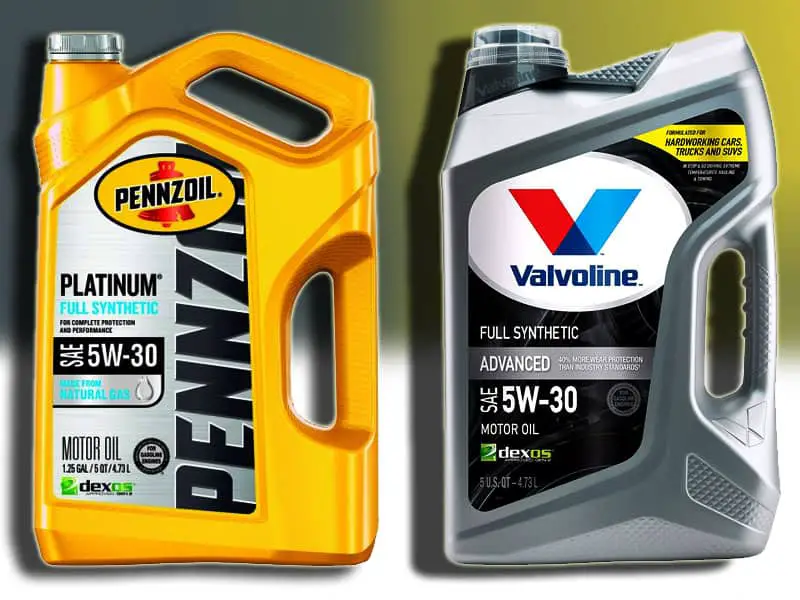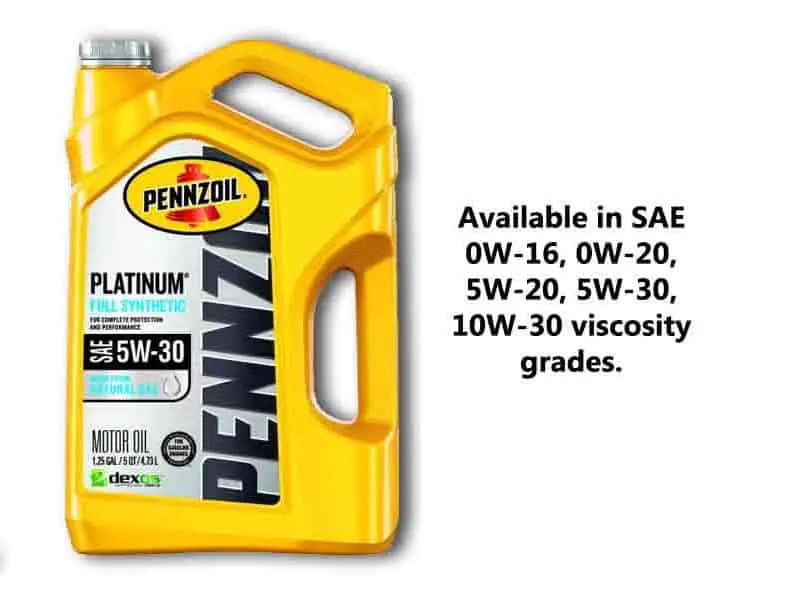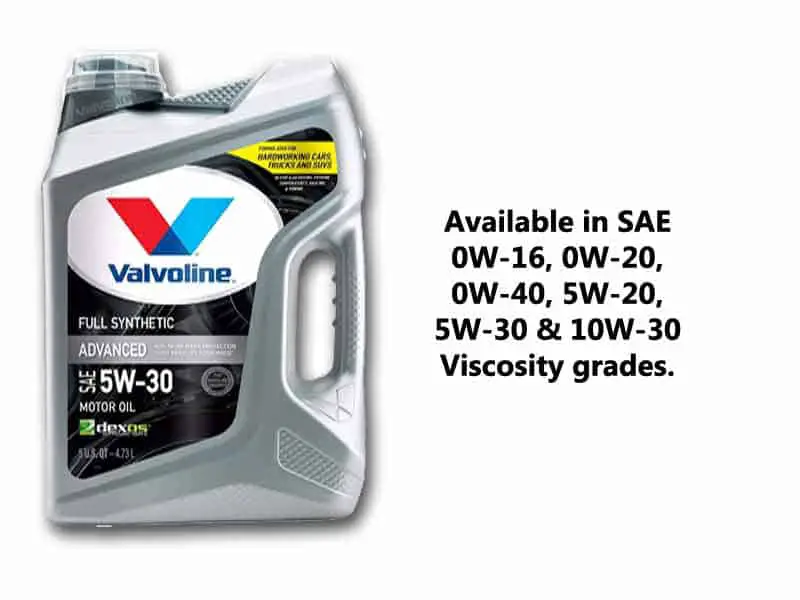Both oils here are fully synthetic used for both gasoline and diesel engines. Valvoline Advanced focuses more on performance, while the Pennzoil Platinum is more oriented towards the overall cleaning of the engine.
Valvoline Advanced is developed from innovative additive technologies to give the user better performance and mileage in extreme and tough conditions. The advanced technology also assists the oil to maximize engine life during high-stress conditions.

Pennzoil Platinum, on the other hand, is a synthetic oil developed from pure natural gas by using Pure Plus Technology, reducing the chances of sludge formation. It is used for both gasoline and diesel engines. Its ultra- cleaning ability provides about 45% extra cleaning to the piston compared to other motor oils. This oil is widely used for the advanced ultra-cleaning of an engine.
The Penzonzoil Platinum has another version called the “Ultra”. It only has a more no. of detergents so it makes the engine cleaning more efficient.
- Difference b/w Pennzoil Platinum and Ultra Platinum.
Table of Contents
Side By Side Comparison:
| Specifications | Valvoline Advanced | Pennzoil Platinum |
| Oil Type | Fully Synthetic | Fully Synthetic |
| Engine Type | Both Gasoline and Diesel Engine | Both Gasoline and Diesel Engine |
| Available viscosity grades | 0W-16, 0W-20, 0W-40, 5W-20, 5W-30 and 10W-30 | 0W-20, 5W-20, 5W-30, 10W-30 and 0W-16 |
| ILSAC | GF-5 | GF-5 |
| API | SP | SN Plus |
| Oil change frequency | 3,000 to 4,000 miles | 5,000 to 7,500 miles |
| Additives | Antioxidant, Detergents, Anti-wear | Dispersants, Antioxidant, Detergents |
| ACEA | A3/B4 | A1/B1, A5/B5 |
Catalytic Converter Performance
The zinc and phosphorus are present in the engine oil as anti-wear additives. As a result of engine oil burning off, these compounds convert into ash, blocking the catalytic converter and hindering its performance.
The Valvoline contains a higher quantity of Zinc and phosphorous for better anti-wear performance as compared to its counterpart. Thus, its performance is lower than Pennzoil’s in terms of catalytic converter.
| Engine oil (5W-20) | Zinc (ppm) | Phosphorus (ppm) |
| Valvoline Advanced | 760 | 660 |
| Pennzoil Platinum | 693 | 610 |
Reduction of Sludge build
The oxidized engine oil combines with the dirt and contaminants to form carbon. The carbon formed as a result further reacts with other impurities and pollutants to form a thick slurry liquid which makes it difficult for the proper functioning of the engine hindering its performance. Detergents and dispersants are both added to the engine oil to minimize sludge build-up.
Valvoline Advanced consists of a higher number of calcium molecules that act as detergents along with a decent number of magnesium-based compounds. Pennzoil Platinum contains a lower number of calcium-based compounds comparatively but it has a higher quantity of magnesium compounds. Both of them contain an almost equal quantity of sodium-based detergents. The higher quantity of calcium gives Valvoline an edge over its competitor in terms of sludge reduction.
| Engine oil (5W-20) | Calcium (ppm) | Sodium (ppm) | Magnesium (ppm) |
| Valvoline Advanced | 1446 | < 5 | 496 |
| Pennzoil Platinum | 982 | < 5 | 684 |
Oil Burn-off protection
Volatility is defined as the rate of the evaporation of the liquid. The higher the volatility of the engine oil, the lower will be its flash point temperature. Flashpoint is a temperature at which the vapors with the lowest vapor pressure can easily be ignited. The lower flashpoint of the engine oil depicts its lesser burn-off protection.
In the case of these respective oils, Valvoline Advanced takes the lead in terms of fuel burn-off protection as its flash point temperature is on the higher side when compared with its rival engine oil. So, if the engine is heated up, Pennzoil will have more chances of evaporating quickly as compared to its competitor.
| Engine Oil (5W-20) | Flash Point |
| Valvoline Advanced | Greater than 390 °F or 199 °C |
| Pennzoil Platinum | 365 °F or 185 °C |
Minimizing Engine Wear-Off
To minimize engine wearing and to ensure engine smooth working different kinds of anti-wear agents and friction modifiers are added to the engine oil. These anti-wear agents build a thin coating of film around the metal parts of the engine which reduces the friction between them and reduces engine wearing and tearing as well.
Valvoline has higher quantities of zinc, phosphorus, and molybdenum compounds to reduce the wearing of the engine. It also possesses a majority number of boron-based additives to further enhance its anti-wearing resistance. Pennzoil contains a lower number of all these additives puting it slightly behind its peer in terms of wear protection
| Engine Oil (5W-20) | Zinc (ppm) | Phosphorus (ppm) | Molybdenum (ppm) | Titanium (ppm) | Boron (ppm) |
| Valvoline Advanced | 760 | 660 | 294 | <1 | 119 |
| Pennzoil Platinum | 693 | 610 | 80 | 2 | 45 |
Viscosity Comparison
The kinematic viscosity of the Valvoline oil is lower than that of its rival at both 40° and 100 °C, indicating its underperformance at both these respective temperatures. The viscosity index of this oil is lower than its competitor indicating that at high temperatures its viscosity is more affected. The pour point of this engine oil is also higher than the other one, indicating its lower performance for cold conditions as well.

On the other hand, the viscosity index of Pennzoil is higher than its rival which shows that its viscosity is relatively less affected by the rise in temperature. Its performance for a colder environment is also much better as its pour point temperature is comparatively lower.

| Engine oil | Kinematic Viscosity at 40°C | Kinematic Viscosity at 100 °C | Viscosity Index | Pour Point |
| Valvoline Advanced | 43.2 cSt | 7.9 cSt | 156 | -39 °C |
| Pennzoil Platinum | 46.5 cSt | 8.4 cSt | 161 | -48 °C |
Oil change Frequency
It is recommended to change the Valvoline oil after every 3000 to 4000 miles duration. The TBN (Total Base Number) value of the engine oil is lower than its rival, indicating that this engine oil is needed to change frequently.
The Pennzoil oil is recommended to change after an average distance of 5,000 to 7,500 miles. As a result, it has higher efficiency and more mileage. The TBN value of this engine oil ishigher than its competitor which shows that it has a high amount of base (KOH) to neutralize the acids which are being produced during the reaction between oxygen and hydrocarbons of the engine oil so the oil does not require to be changed regularly, improving its fuel economy.
| Engine Oil (5W-20) | TBN value |
| Valvoline Advanced | 8.1 |
| Pennzoil Platinum | 8.4 |
So what we’ve learned?
- Valvoline Advanced is prepared from conventional base oil while Pennzoil Platinum is made up of natural gas.
- The catalytic converter performance of Pennzoil is better due to the presence of a lower amount of Zinc and Phosphorus.
- Valvoline removes the sludge and varnishes more effectively as compared to its competitor.
- The volatility of Valvoline is lower than Pennzoil due to its higher flashpoint.
- The wearing of the engine is lower in the case of Valvoline because of more friction modifiers and anti-wear agents. (Zn and P)
- The viscosity of the Valvoline is more affected when the temperature rises so it has a lower viscosity index.
- Pennzoil is relatively cheaper than its counterpart.